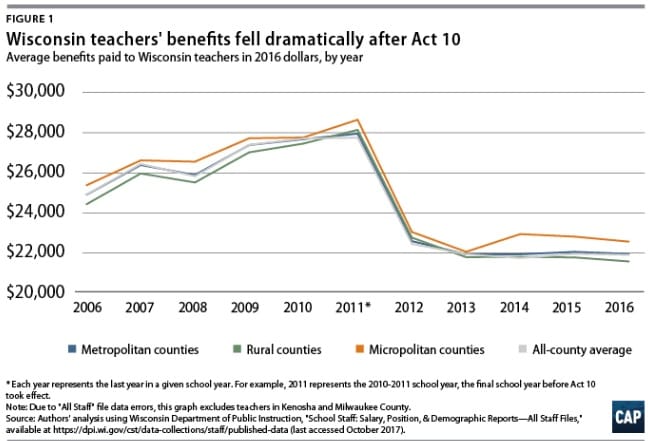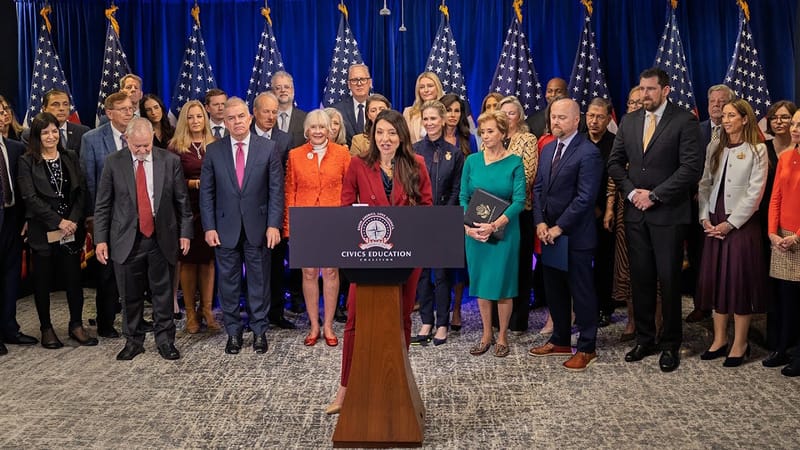Next step in attempt to repeal Act 10 is court of appeals
If the Act 10 challenge is successful, it would restore collective bargaining rights for many public employees in Wisconsin, including teachers, nurses, prison guards, and other state government employees

The winter of 2011 was a chaotic time in Wisconsin history. Thousands of public employees and their supporters protested at the Wisconsin State Capitol for weeks. The chaos and division culminated in the passage of Act 10 on March 11. The law significantly curtailed the rights of most public employee unions, particularly those representing state workers, teachers, and other non-public safety employees. Public safety unions like those representing police and firefighters were largely exempt from these restrictions.
“It started with the story that the budget needed fixing,” said Corey Otis, President of the Appleton Education Association. “They used the worst-case scenario for requests and the worst-case scenario for revenue. All of a sudden, we had this deficit. It was manufactured. It really was about taking away the voice of educators, not only in their own districts, but also in politics.”
The impact of Act 10 on educators and education is significant
Act 10 limited collective bargaining to wages, but only up to the rate of inflation, stripping unions of the right to negotiate working conditions and benefits such as paid time off and health insurance.
The law requires public sector unions to hold annual recertification votes, with a majority vote of all members (not just those voting). This year, approximately 72 percent of Appleton school district educators approved the recertification vote.
“Union membership is down across the state,” Otis said. “I think that was a goal of Act 10, more than being a financial solution. Dropping the membership in the state union and also dropping the union's power politically, that's really what it was all about.”

Otis said it’s important that educators and support professionals receive a living wage and Act 10 had a significant impact on attracting and retaining educators. When adjusted for inflation, the median-paid teacher earned 12.3 percent less than in 2009. In 2023, the median teacher salary in Wisconsin was $59,250. The starting salary for an Appleton teacher is $47,650, while support professionals earn $16.82/hr.
In addition to Act 10, other factors contributing to the decline in real wages include limited state funding and teacher turnover. The average annual teacher turnover rate in Wisconsin was 9.5 percent in the 2024-25 school year, with nearly 45 percent of teachers leaving within the first seven years of their careers.
Other factors contributing to Wisconsin’s teacher shortage are stress, workload and lack of support.

The law was promoted as a move to a merit-based pay system. In reality, school districts could not provide merit pay because of the limited increases provided through state funding, which varied greatly throughout the state. While Act 10 may have incentivized some teachers to seek out positions in higher-performing schools with higher salaries, the poaching often negatively impacted schools and teacher quality.
The case is now being appealed to the Wisconsin Court of Appeals. After the decision of the Appeals Court is announced, the case will most likely be appealed to the Wisconsin Supreme Court. If the Act 10 challenge is successful, it would restore collective bargaining rights for many public employees in Wisconsin, including teachers, nurses, prison guards, and other state government employees.
In December 2024, a Dane County Circuit Court judge ruled that parts of Act 10 violated the Wisconsin Constitution's equal protection guarantees because not all public employees are treated the same. The judge issued a temporary stay of his Act 10 decision, pending further court decisions.
Republican talking points don’t tell the entire story
Some Republicans say that the repeal of Act 10 will trigger huge tax hikes. But given that each public school district is constrained by their revenue cap, that seems unlikely. The revenue cap is the spending amount allowed by the Wisconsin Legislature, which can only be changed by the legislature or surpassed via referendum.
Last November, Rep Dean Kaufert (R-Neenah) was elected to represent Assembly District 53, following his eight years as mayor of Neenah. Before that, he served in the state assembly and was there during the Act 10 fight. Although Kaufert voted against the bill at that time, he now expresses a different opinion.
“When I became mayor, Act 10 was the best thing that happened to this state. Because as mayor, we couldn’t have had a balanced budget without Act 10,” he said.
In a recent budget listening session, Rep Kaufert echoed WILL, the Wisconsin Institute of Law and Liberty, when he warned that should Act 10 be repealed, there would be tremendous tax increases.
In truth, the most significant tax increase in the past 12 years was the Republican private school voucher tax which amounted to over $633 million in the 2024-25 school year, not including independent charter schools. That tax is growing annually.
Research consistently shows that a teacher is a highly significant factor in a child’s success, often exceeding the impact of other variables. Teachers have a profound influence on student achievement, longer-term outcomes, and even their personal development.
“It could happen that Act 10 goes away,” Otis said. “And recertification goes away. We’re hoping this will be the last fall we have to do the recertification.”






